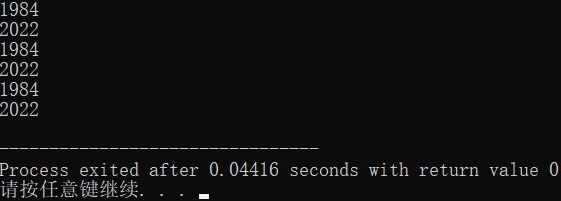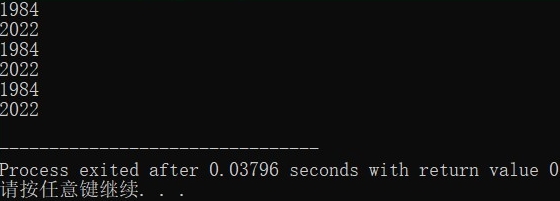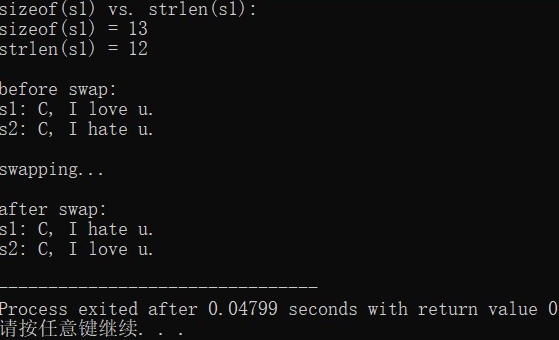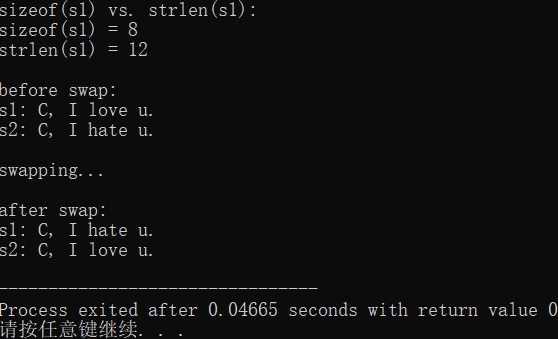实验6
#include <stdio.h> #define N 4 int main() { int x[N] = {1, 9, 8, 4}; int i; int *p; printf("%d", x[i]); printf("\n"); for(p=x; p<x+N; ++p) printf("%d", *p); printf("\n"); p = x; for(i=0; i<N; ++i) printf("%d", *(p+i)); printf("\n"); p = x; for(i=0; i<N; ++i) printf("%d", p[i]); printf("\n"); return 0; }

#include <stdio.h> #define N 4 int main() { char x[N] = {'1', '9', '8', '4'}; int i; char *p; for(i=0; i<N; ++i) printf("%c", x[i]); printf("\n"); for(p=x; p<x+N; ++p) printf("%c", *p); printf("\n"); p = x; for(i=0; i<N; ++i) printf("%c", *(p+i)); printf("\n"); p = x; for(i=0; i<N; ++i) printf("%c", p[i]); printf("\n"); return 0; }

1、2004
2、2001
#include <stdio.h> int main() { int x[2][4] = { {1,9,8,4}, {2,0,2,2}} ; int i, j; int *p; int (*q)[4]; for(i=0; i<2; ++i) { for(j=0; j<4; ++j) printf("%d", x[i][j]); printf("\n"); } for(p = &x[0][0], i = 0; p < &x[0][0] + 8; ++p, ++i) { printf("%d", *p); if( (i+1)%4 == 0) printf("\n"); } for(q=x; q<x+2; ++q) { for(j=0; j<4; ++j) printf("%d", *(*q+j)); printf("\n"); } return 0; }

#include <stdio.h> int main() { char x[2][4] = { {'1', '9', '8', '4'}, {'2', '0', '2', '2'} }; int i, j; char *p; char (*q)[4]; for(i=0; i<2; ++i) { for(j=0; j<4; ++j) printf("%c", x[i][j]); printf("\n"); } for(p = &x[0][0], i = 0; p < &x[0][0] + 8; ++p, ++i) { printf("%c", *p); if( (i+1)%4 == 0) printf("\n"); } for(q=x; q<x+2; ++q) { for(j=0; j<4; ++j) printf("%c", *(*q+j)); printf("\n"); } return 0; }

1、2004
2、2016
3、2001
4、2004
#include <stdio.h> #include <string.h> #define N 80 int main() { char s1[] = "C, I love u."; char s2[] = "C, I hate u."; char tmp[N]; printf("sizeof(s1) vs. strlen(s1): \n"); printf("sizeof(s1) = %d\n", sizeof(s1)); printf("strlen(s1) = %d\n", strlen(s1)); printf("\nbefore swap: \n"); printf("s1: %s\n", s1); printf("s2: %s\n", s2); printf("\nswapping...\n"); strcpy(tmp, s1); strcpy(s1, s2); strcpy(s2, tmp); printf("\nafter swap: \n"); printf("s1: %s\n", s1); printf("s2: %s\n", s2); return 0; }

1、13;s1实际占用内存数;s1有效字符数
2、否
3、是
#include <stdio.h> #include <string.h> #define N 80 int main() { char *s1 = "C, I love u."; char *s2 = "C, I hate u."; char *tmp; printf("sizeof(s1) vs. strlen(s1): \n"); printf("sizeof(s1) = %d\n", sizeof(s1)); printf("strlen(s1) = %d\n", strlen(s1)); printf("\nbefore swap: \n"); printf("s1: %s\n", s1); printf("s2: %s\n", s2); printf("\nswapping...\n"); tmp = s1; s1 = s2; s2 = tmp; printf("\nafter swap: \n"); printf("s1: %s\n", s1); printf("s2: %s\n", s2); return 0; }

1、字符串起始地址;字符串起始地址实际占的字节数;指针变量所指向的字符串的有效字符数
2、能
3、指针所指的位置;没有
#include <stdio.h> #include <string.h> #define N 5 int check_id(char *str); int main() { char *pid[N] = {"31010120000721656X", "330106199609203301", "53010220051126571", "510104199211197977", "53010220051126133Y"}; int i; for(i=0; i<N; ++i) if( check_id(pid[i]) ) printf("%s\tTrue\n", pid[i]); else printf("%s\tFalse\n", pid[i]); return 0; } int check_id(char *str) { if(strlen(str)!=18) return 0; while(*str) { if(*str>='0'&&*str<='9'||*str=='X') str++; else return 0; } return 1; }

#include <stdio.h> #include <string.h> #define N 80 int is_palindrome(char *s); int main() { char str[N]; int flag; printf("Enter a string:\n"); gets(str); flag = is_palindrome(str); if (flag) printf("YES\n"); else printf("NO\n"); return 0; } int is_palindrome(char *s) { int i,j; i=strlen(s); for(j=0;j<i;) { if(*(s+j)==*(s+i-1-j)) j++; else return 0; } return 1; }


#include <stdio.h> #define N 80 void encoder(char *s); void decoder(char *s); int main() { char words[N]; printf("输入英文文本: "); gets(words); printf("编码后的英文文本: "); encoder(words); printf("%s\n", words); printf("对编码后的英文文本解码: "); decoder(words); printf("%s\n", words); return 0; } void encoder(char *s) { char *p; p=s; while(*p) { if((*p>='A'&&*p<'Z')||(*p>='a'&&*p<'z')) *p+=1; else if(*p=='Z'||*p=='z') *p-=25; p++; } } void decoder(char *s) { char *p; p=s; while(*p) { if((*p>'A'&&*p<='Z')||(*p>'a'&&*p<='z')) *p-=1; else if(*p=='A'||*p=='a') *p+=25; p++; } }




